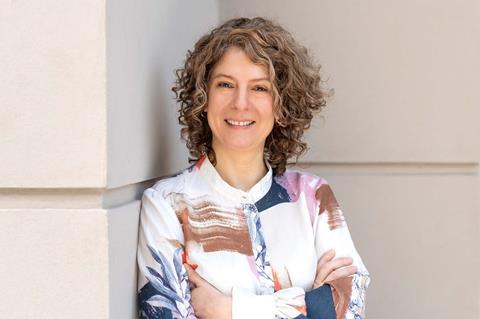
The new leadership team of Europa International, the organisation that represents international sales agents, has set out its priorities for the year ahead in a Screen interview.
Films Boutique international sales manager Valeska Neu was elected as Europa International’s president in May, while producer Alice Ormières joined as its full-time managing director in autumn 2024
Founded in 2011, one of Europa International’s key roles is to raise awareness about the role of sales agents and their essential position within the film ecosystem among policymakers and politicians. It also acts as a network so members can pool experience and information, ultimately seeking to improve the international distribution of European films.
Collaboration
Europa International is smaller than many industry associations, such as producer or distributor groups, but has a key role to play as an outfit “that is linked to everybody, from producers to distributors and exhibitors,” says Neu.
One of Neu’s priorities as president is to collaborate more with other European associations. “We have to understand that we are one industry — and not a particularly big industry — and it will be more and more important to stand together and speak in the interests of us all.”
Collaboration is important against the backdrop of a challenging market for all of the industry’s key stakeholders. Cinemas are slowly recovering from the worst of the pandemic era, especially in bigger cities across Europe.
But, as Neu suggests, the market is shrinking. Cinemagoers are concentrating on a smaller number of films, while the industry is continuing to produce a huge number (2,358 features were produced in Europe alone in 2023, according to the European Audiovisual Observatory). Distributors are more cautious as a result.
“The biggest challenge for sales agents is that you have several films [on your slate] and you want to sell them all — but it’s not as easy as it was 10 years ago,” says Neu.
Creative Europe worries
In parallel, there is growing concern about changes to EU funding and regulation. Europa International is particularly focused on the European Commission’s planned changes to Creative Europe Media, the programme that underpins much of Europe’s independent film ecosystem.
At first glance, the changes look promising: the Commission has allocated €8.6bn ($10bn) for the new AgoraEU, which will replace Creative Europe — a significant increase. But a redesigned Media+ strand would have a much broader scope, supporting not just film and audiovisual, but news media as well. At this stage, it is unclear what funding share will be allocated to film, which is a concern for both Neu and Ormières. (Currently, 58% of the Media budget is ring-fenced for audiovisual.)
Sales agents benefit from two Media schemes in particular: the automatic European Film Sales Support scheme, worth €5m ($5.8m) per year, and the selective Films on the Move programme, worth €21m ($25m) in 2026. Both Neu and Ormières stress how important these schemes are for sales agents, both to support new talent and boost audiences for European films.

But Ormières is concerned that the proposed Media+ strand may focus less on supporting European culture, and more on tackling fake news and preserving the freedom of news media. Just as important, she says, is “the freedom of creation that we represent as the film industry. There is no freedom of speech or freedom of the news if we do not foster this artistic freedom.”
Protecting the ecosystem
Beyond Creative Europe, Europa International lobbies on other issues that are important to sales agents. It has to “constantly justify” to European politicians the film and TV industry’s important exemption from the EU’s geo-blocking regulation. Without it, the European film industry’s delicate funding ecosystem, based on a territorial financing model, would collapse.
Similarly, the EU’s pivotal Audiovisual Media Services Directive (AVMSD) — particularly its quotas and local investment obligations — are closely monitored. Neu and Ormières say the legislation is vital for ensuring a diverse pipeline of European films.
Consolidation is also an issue for the sales industry. Many of France’s biggest sellers are part of larger broadcasting, cinema or production groups, from Pathé and Gaumont to France Télévisions, SND and Studio TF1. The growing Vuelta Group now houses Global Constellation, Playtime, Films Boutique and Be For Films. “We will see more consolidation in the future because the sector is so challenging,” says Neu.
Membership
Europa International’s members handled almost 70% of the films selected in Cannes this year.
The organisation represents 58 sales company members from 12 countries, mainly from France, Italy, Spain and Germany, but also Poland, Greece, the UK and Scandinavia. Many of its members are mid-sized companies with five to 10 employees — although its membership includes large and small sellers.
The number of members has increased over the years, with eight joining this year, among them new and veteran sales outfits: Bendita Film Sales and Filmax from Spain, Rai International from Italy and B-Rated, Loco Films, Lucky Number, Salaud Morisset and The Bureau Film Sales from France.
Despite the challenges facing the film industry, “there are still people brave enough to open sales outfits these days,” says Neu.
Europa International’s board, all of whom — including Neu — are voluntary, includes Geremia Biagiotti of Intramovies, Samuel Blanc (The Party Film Sales), Monica Ciarli (Minerva Pictures), Alice Lesort (Les Films du Losange), Katarzyna Siniarska (New Europe Film Sales) and Léo Teste (Global Constellation).
The organisation’s members meet up at Berlin and Cannes, and it holds a general assembly once a year at a major festival — this year at San Sebastian.















![[L-R]: Amanda Villavieja, Laia Casanovas, Yasmina Praderas](https://d1nslcd7m2225b.cloudfront.net/Pictures/274x183/6/4/1/1471641_pxl_20251224_103354743_618426_crop.jpg)









No comments yet